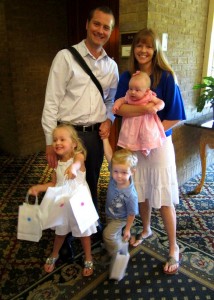 My webmaster, son-in-law Adam, is an ongoing blessing to me, not just because he manages GettingThroughThis.com but because he’s a young man walking close to God and through that is a good example to everyone around him. He’s also a dedicated husband to my daughter Linnea and a committed father to Skylar, Micah, and Autumn, all-in on that big job.
My webmaster, son-in-law Adam, is an ongoing blessing to me, not just because he manages GettingThroughThis.com but because he’s a young man walking close to God and through that is a good example to everyone around him. He’s also a dedicated husband to my daughter Linnea and a committed father to Skylar, Micah, and Autumn, all-in on that big job.
Adam has served not only as webmaster but also as my stalwart encourager. Once in a while people mention “my advanced computer skills,” and I quickly deliver the truth. Each web site task has been painstakingly learned through trial and error (think error and more error) at the expense of Adam’s gentle supervision. He doesn’t lose patience with my re-asking the same questions but re-answers as if I’d never asked.
If it wasn’t for Adam, this blog wouldn’t exist, and for more reasons than one, I’m glad it does. If it didn’t, I’d be missing out on the wealth of blessing funneling back through readers. Emails and comments embedded with nuggets of gold go to my “Interesting things to file” folder, an ever-growing file of gems.
And here’s an example:
Linda, a cyber-acquaintance, is traveling through the painful “firsts” of new widowhood after losing her husband of 37 years. She wrote to me of her love for him and how he had put her needs ahead of his own, one of the most difficult tasks anyone can tackle. She misses him intensely but is determined to remain above negativity.
She wrote, “A quote by Dr. Seuss is my new mantra: ‘Don’t cry because it’s over. Smile because it happened.’ I’m choosing not to be mad at God, and I’m thankful for the love I enjoyed for so long, choosing not to be ungrateful because it ended.”
Linda has the right idea: (1) choosing not to be mad at God, and (2) being thankful for her husband’s love.
Interestingly, Step 1 is what opens the door to Step 2. If we indulge in anger toward the Lord, thankfulness will elude us, but as we set aside our natural desire to blame someone, (especially God), gratitude no-matter-what becomes possible.
Each of us have daily opportunities to think and act like Linda. If we make up our minds to be thankful, that outlook empowers us toward additional good things, like giving our time to others, making sure the excluded are included, going out of our way to serve, and like Linda’s John, putting the needs of others ahead of our own.
I’ve got a long way to go to catch Linda, but her fine example proves it’s possible. So I’m starting right now, feeling thankful for:
- Linda.
- other widows who’ve shared their stories.
- 40 years with Nate.
- a God who has partnered with me through 3½ years of widowhood.
- Adam, a son-in-law who kindheartedly taught me how to blog.
“Fix your thoughts on what is true, and honorable, and right, and pure, and lovely, and admirable.” (Philippians 4:8)




